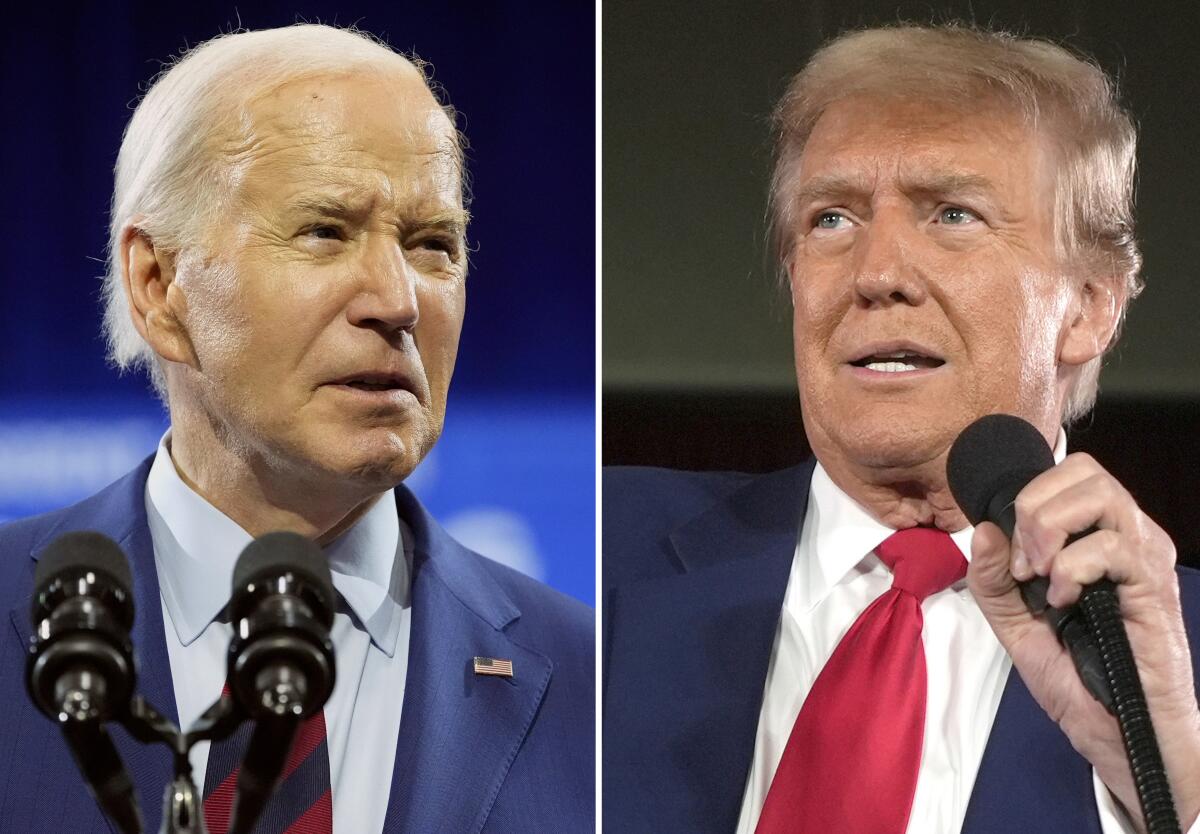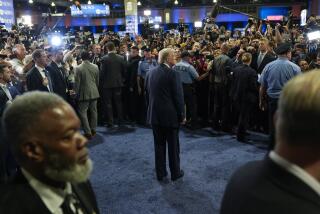Biden, Trump agree to debates: June 27 on CNN, Sept. 10 on ABC

WASHINGTON — President Biden and former President Trump on Wednesday agreed to hold two campaign debates — the first on June 27 hosted by CNN and the second on Sept. 10 hosted by ABC — setting the stage for the first presidential face-off in just weeks.
The quick agreement on the timetable to meet followed the Democrat’s announcement that he will not participate in fall presidential debates sponsored by the nonpartisan commission that has organized them for more than three decades.
Biden’s campaign instead proposed that media outlets directly organize the debates with the presumptive Democratic and Republican nominees, with the first to be held in late June and the second in September before early voting begins. Trump, in a post on his social media site, said he was “Ready and Willing to Debate” Biden at the proposed times.
Hours later, Biden said he had accepted an invitation from CNN to a debate on June 27, adding, “Over to you, Donald. As you said: anywhere, anytime, any place.” Trump told Fox News Digital that he had accepted the invitation: “I’ll be there.” Soon after, they accepted a second debate set for Sept. 10 on ABC.
The swiftness with which the June matchup came together reflects how each of the candidates thinks he can get the better of his opponent in the showdown.
The June 27 debate will take place in an Atlanta studio, with no audience, CNN officials said. Moderators were not announced. Disagreements about moderators and debate rules were some of the very questions that prompted the formation of the Commission on Presidential Debates in 1987.
The two campaigns and television networks had held weeks of informal talks on ways to circumvent the commission’s control over presidential debates, owing to years of complaints and perceived slights, according to two people familiar with the matter.
Biden’s campaign had proposed excluding third-party candidates, such as Robert F. Kennedy Jr., from the debates. Under the debate commission’s rules, Kennedy or other third-party candidates could qualify if they secured ballot access sufficient to claim 270 electoral votes and polled at 15% or higher in a selection of national polls.
CNN held open the door to Kennedy’s participation if he or any other candidate met polling and ballot access requirements similar to the commission’s.
As recently as Wednesday morning, Trump expressed his desire for a large live audience.
“I would strongly recommend more than two debates and, for excitement purposes, a very large venue, although Biden is supposedly afraid of crowds — that’s only because he doesn’t get them,” Trump said. “Just tell me when, I’ll be there.”
Trump has been pushing for more debates and earlier debates, arguing voters should be able to see the two men face off well before early voting begins in September. He has repeatedly said he will debate Biden “anytime, anywhere, any place,” even proposing the two men face off outside the Manhattan courthouse where he is on criminal trial in a hush money case. He also has been taunting Biden with an empty lectern at some of his rallies.
Trump’s campaign on Wednesday challenged the Biden campaign to agree to at least two other debates between the candidates in addition to the June and September dates. The Biden campaign did not immediately respond to a request for comment.
Biden’s campaign has long held a grudge against the nonpartisan commission for failing to evenly apply its rules during the 2020 Biden-Trump matchups — most notably when it didn’t enforce its COVID-19 testing rules on Trump and his entourage.
Biden campaign Chair Jen O’Malley Dillon on Wednesday sent a letter to the Commission on Presidential Debates to say that Biden’s campaign objected to the fall dates selected by the commission, which come after some Americans begin to vote, repeating a complaint also voiced by the Trump campaign. She also voiced frustrations over the rule violations and the commission’s insistence on holding the debates before a live audience.
“The debates should be conducted for the benefit of the American voters, watching on television and at home — not as entertainment for an in-person audience with raucous or disruptive partisans and donors,” she said.
“As was the case with the original televised debates in 1960, a television studio with just the candidates and moderators is a better, more cost-efficient way to proceed: focused solely on the interests of voters,” O’Malley Dillon added.
There was little love lost for the commission as well from Trump, who objected to technical issues at his first debate with Democrat Hillary Clinton in 2016 and was upset after a debate with Biden was canceled in 2020 after the Republican came down with COVID-19.
The Republican National Committee had already promised not to work with the commission on the 2024 contests.
The Trump campaign issued a statement on May 1 that objected to the scheduled debates by the commission, saying that the schedule “begins AFTER early voting” and that “this is unacceptable” because voters deserve to hear from the candidates before ballots are cast.
Kennedy, in a statement, said: “Presidents Trump and Biden are colluding to lock America into a head-to-head matchup that 70% say they do not want. They are trying to exclude me from their debate because they are afraid I would win. Keeping viable candidates off the debate stage undermines democracy.”
In teeing up the debates, Biden and Trump traded barbs on social media — each claiming victory the last time they faced off in 2020.
“Donald Trump lost two debates to me in 2020, since then, he hasn’t shown up for a debate,’ Biden said in a post on X. “Now he’s acting like he wants to debate me again. Well, make my day, pal.”
Trump said on social media that Biden was the “WORST debater I have ever faced — He can’t put two sentences together!”
The Democrat suggested that the two candidates could pick some dates, taking a dig at Trump’s ongoing New York hush money trial by noting that the Republican is “free on Wednesdays,” the usual day off in the trial.
Miller, Colvin and Boak write for the Associated Press. Times staff writer Stephen Battaglio in New York contributed to this report.
More to Read
Get the L.A. Times Politics newsletter
Deeply reported insights into legislation, politics and policy from Sacramento, Washington and beyond. In your inbox three times per week.
You may occasionally receive promotional content from the Los Angeles Times.










